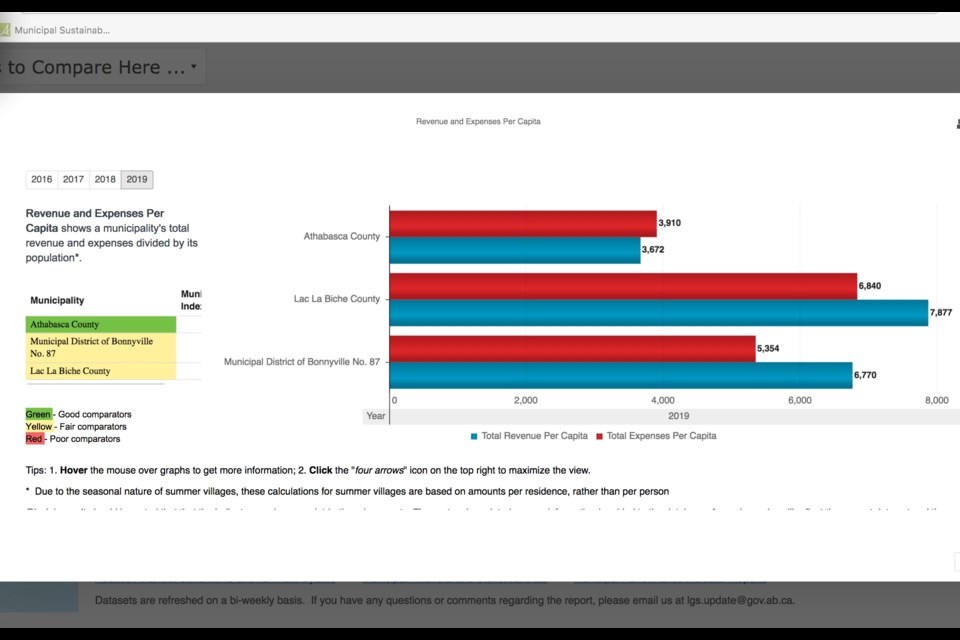LAKELAND - Metrics, details, visualizations, a dashboard, an index, or a report card as the premier has called it — even a multi-purpose tool, like a Leatherman, says Alberta's Minister of Municipal Affairs. That's how the recently released Municipal Measurement Index (MMI) is being described by its creators in the provincial government.
A little confusing, is how Lac La Biche County Mayor Omer Moghrabi describes the online website that allows residents, elected officials and potential business clients to compare the province's 300 municipalities based on such metrics as tax rates, accumulated surplus, municipal debt, revenues and expenses per capita.
Admitting he hasn't had "much of a chance to play" with the online resource that was unveiled last Tuesday, the mayor says the comparative compilation of several financial and populations-based categories from recent years doesn't paint the entire picture of any municipality.
"It's more of a snapshot," he says.
Lac La Biche County's CAO Ken Van Buul — who officially took the title on Monday after several months as the interim CAO — says the various pieces of statistical information make up only a small part of a community mosaic.
"I'd say that if you are using it as part of the story, well then OK, but you can't use it as the whole story," Van Buul told Lakeland This Week, explaining that the statistical information doesn't show the cause and effect of municipal decision-making. "There's a whole lot of things that we have to analyze and determine before we say yes or no to any issue ... and the most important piece of information for us — which is not in that data — is what do our ratepayers want?"
Alberta Municipal Affairs Minister Tracy Allard spoke with Lakeland This Week and other rural media outlets last Thursday. She too admits there are limitations to the index, but she says the website is a starting point to create discussions between municipal officials and the people they represent.
"Find what you find on the index, and then speak with the local leaders ... because there may be more data that isn't easy to measure that might help provide some context and understanding around the differentials that are existing," said Allard, explaining the website dashboard as a collection point to make information easier to access. "This is an age where we have more data at our fingertips than ever before.... and we need to make sure the data is accurate and then use that data accordingly."
One issue with the index, admits the minister, is a time lag in that data. The current index contains statistical data collected in-house by Municipal Affairs staff from 2014-2018. A new roll-out of information expected for early in 2021 will update that information to include 2019 data.
It's the best they can do, says the minister.
"It is a two-year delay or 18-month delay to collate the data, vet the data from the municipal reporting that comes back to the department. and then we can put it into the index," she said. "So in January of 2022 we can put in the 2020 data."
Report Card grade
That kind of delay and use of historic data is one of the reasons the index isn't used to determine immediate changes to municipalities. When asked if the provincial government will use the information to reward or penalize municipalities, Allard said although the premier has called the index a municipal report card, it won't be used to 'pass' or 'fail' communities.
"It's kind of a misnomer in that there really isn't a grade for a city — but in the minds of the voter and in the minds of Albertans, they want responsible government, fiscally responsible government, small government, and they want government that is creating jobs and getting visibly local results. I believe that is how you get an A with your constituents in times like this," she told Lakeland This Week.
While provincial officials announced last week that the online dashboard is ready for the public, Allard admits the release is a bit of a "beta test," hoped to draw feedback from the public, industry and municipalities.
Although officials from the Rural Municipalities Association and the Alberta Urban Municipalities Association were given a briefing before the index's release, Allard admits there are "concerns about some of the metrics chosen" from the associations. She says those concerns are part of the feedback process taking place before the next roll-out of information.
Comparing council pay
It was asked if new categories would include comparisons on how much elected municipal officials make.
Allard said the topic is something she has heard several times during the creation and recent release of the index.
"That has already come up a few times, and we haven't made any decisions yet," said the minister, remaining non-committal on the subject. " ... that one has come up a number of times..... I won't promise you that it will go in, but it's certainly something we would consider."
How the public, industry, municipal officials or other levels of government will use the index is not specifically known, but providing the resource and giving the public the opportunity to use it, is something the government promised Albertans, said Allard.
"I belive that this tool has the capacity to be almost like a Leatherman, where there are multiple purposes for it," she said.
Back in Lac La Biche County, while Van Buul appreciates the resource, he said like the Leatherman tool, there has to be some safety measures in place when using it. He cautions users about the limited background of the metrics on display. Saying a little knowledge can be a dangerous thing, he encourages the public to contact municipal administrators with any questions the dashboard may bring.
"I agree, it is a tool — but it's not the tool," he said.
The Municipal Measurement Index can be found at www.alberta.ca/municipal-measurement-index, or click the direct link in the online version of this story.



